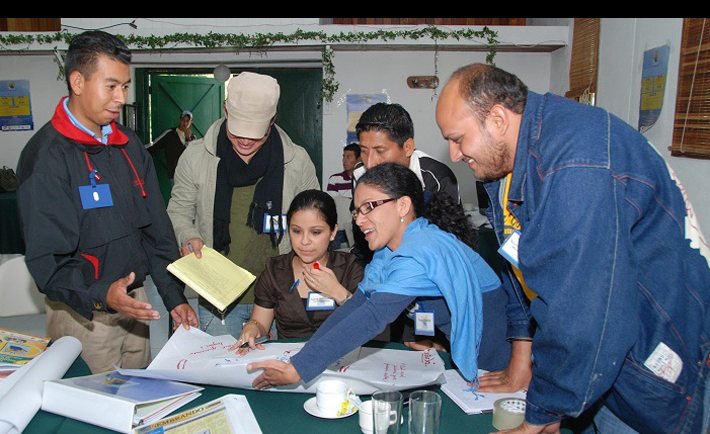
During the strategic planning session of NDI Nicaragua's Certificate in Leadership and Political Management (CLPM) program, a group of participants from several civil society organizations (CSOs) work together to create a problem tree.
Each week NDI’s Citizen Participation team provides a resource to assist NDI staff in meeting the objectives of their programs. This past month’s resources analyzed how to make politically informed decisions when implementing development programs, outlined key principles to guide the effective use of Theories of Change, conveyed evidence-based recommendations on the dynamic between democratization initiatives and violent conflict, and reviewed how digital information and communications technologies (ICTs) can impact development and inequality. These resources provide CSOs and practitioners with tools and insights for implementing politically smart, culturally informed and effective development practices and programs.
Everyday Political Analysis, published by the Developmental Leadership Program, introduces a political analysis framework called “Everyday Political Analysis” (EPA), designed to help development practitioners think and work more politically. The EPA framework involves two steps: 1) understanding interests and 2) understanding change. For each step, five questions accompanied by prompts help practitioners understand diverse and changing political contexts and make politically informed decisions on a day-to-day basis. Approaches such as EPA that are iterative and accompany change can help make development practices and outcomes more effective, politically smart and sustainable.
Developmental Leadership Program, introduces a political analysis framework called “Everyday Political Analysis” (EPA), designed to help development practitioners think and work more politically. The EPA framework involves two steps: 1) understanding interests and 2) understanding change. For each step, five questions accompanied by prompts help practitioners understand diverse and changing political contexts and make politically informed decisions on a day-to-day basis. Approaches such as EPA that are iterative and accompany change can help make development practices and outcomes more effective, politically smart and sustainable.
 Theories of Change: Time for a radical approach to learning in development, published by ODI, outlines the growing and diverse ways in which Theories of Change are understood and operationalized in development. Theories of Change hold the potential to radically improve and reform learning and practice in development, but this requires an effective engagement and understanding of the approach. The report examines four key principles to guide the effective use of Theories of Change which include: focus on process, prioritize learning, be locally led, and think compass not map.
Theories of Change: Time for a radical approach to learning in development, published by ODI, outlines the growing and diverse ways in which Theories of Change are understood and operationalized in development. Theories of Change hold the potential to radically improve and reform learning and practice in development, but this requires an effective engagement and understanding of the approach. The report examines four key principles to guide the effective use of Theories of Change which include: focus on process, prioritize learning, be locally led, and think compass not map.
 Investing in Iraq’s Peace: How Good Governance Can Diminish Support for Violent Extremism, published by Mercy Corps, suggests that comprehensive approaches that consider the dynamic between democratization initiatives and violent conflict can go a long way toward building stability and advancing sustainable peace and development in fragile communities. The report’s most notable findings include: 1) poor governance that results in injustice, real or perceived, is a key driver of conflict; 2) good governance is essential to addressing the root causes of instability, with an active civil society being vital to good governance; and 3) empowering youth and other marginalized populations, who are most susceptible to recruitment by armed groups, to direct their grievances towards government through nonviolent action can help curtail public support for violent extremism.
Investing in Iraq’s Peace: How Good Governance Can Diminish Support for Violent Extremism, published by Mercy Corps, suggests that comprehensive approaches that consider the dynamic between democratization initiatives and violent conflict can go a long way toward building stability and advancing sustainable peace and development in fragile communities. The report’s most notable findings include: 1) poor governance that results in injustice, real or perceived, is a key driver of conflict; 2) good governance is essential to addressing the root causes of instability, with an active civil society being vital to good governance; and 3) empowering youth and other marginalized populations, who are most susceptible to recruitment by armed groups, to direct their grievances towards government through nonviolent action can help curtail public support for violent extremism.
 World Development Report 2016: Digital Dividends, published by the World Bank Group, provides a comprehensive overview of how ICTs can impact development and inequality. ICTs hold the potential to be transformative, yet are falling short as the internet remains unavailable, inaccessible, and unaffordable to a majority of the world’s population. Digital ICTs can increase citizen participation by helping citizens overcome information barriers and creating virtual spaces to monitor political processes and catalyze collective action. Yet they can fall short if not complemented by sustained citizen mobilization and action offline.
World Development Report 2016: Digital Dividends, published by the World Bank Group, provides a comprehensive overview of how ICTs can impact development and inequality. ICTs hold the potential to be transformative, yet are falling short as the internet remains unavailable, inaccessible, and unaffordable to a majority of the world’s population. Digital ICTs can increase citizen participation by helping citizens overcome information barriers and creating virtual spaces to monitor political processes and catalyze collective action. Yet they can fall short if not complemented by sustained citizen mobilization and action offline.
